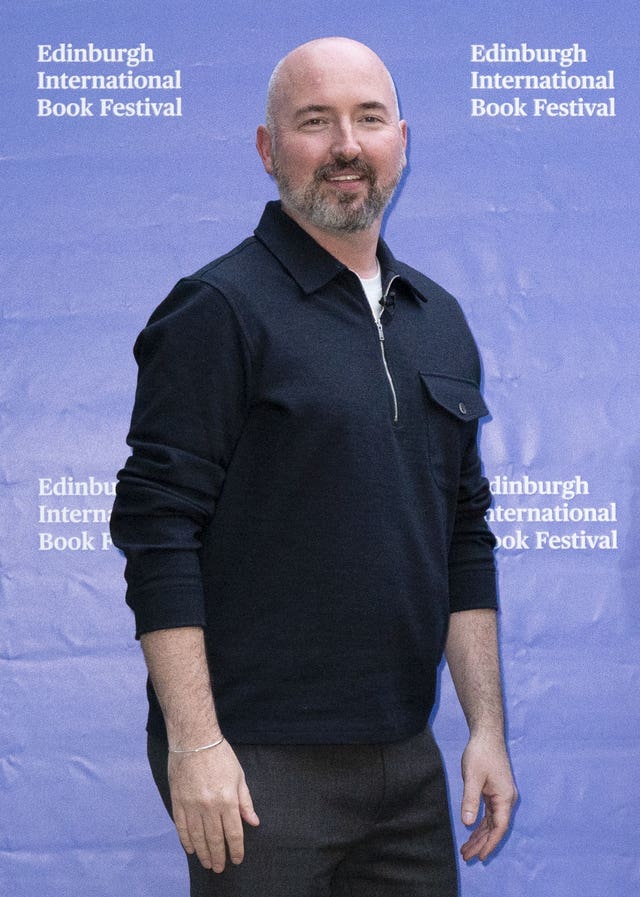
Booker Prize-winning author Douglas Stuart has opened up about his difficult upbringing in Glasgow and how it influenced his next novel as he was interviewed by Scotland’s First Minister Nicola Sturgeon.
Stuart, who won multiple awards for his debut work Shuggie Bain, spoke to Ms Sturgeon in front of a live audience at the Edinburgh International Book Festival.
The First Minister was able to attend the event at the Edinburgh College of Art after testing negative for Covid-19.
She had been self-isolating after being identified as a close contact of someone with the virus.
One of the last events @edbookfest sees First Minister @NicolaSturgeon interviewing 2020 @TheBookerPrizes winner @Doug_D_Stuart about his Glasgow set novel #shuggiebain @panmacmillan and his future plans. Watch from 8.30pm @edbookfest . pic.twitter.com/oa4bh0Qz4u
— Edinburgh Festivals (@edfests) August 30, 2021
Stuart discussed the influences behind Shuggie Bain before giving a reading from his next book Young Mungo, which will be published in April next year.
He said the new book was written before he was long listed for the Booker Prize and “comes from a personal place”.
He said: “It’s a story about two young men. Writing Shuggie asked me a question. It asked me about Shuggie’s sexuality, it asked me about what we did to young men, working class men, what we expect of them, how we hurt them, as we do.
“And I couldn’t answer that in this book… so I wanted to go away and look at two teenage boys growing up in 1991 in the East End of Glasgow, one of the most deprived neighbourhoods like I grew up in myself, and just sort of think about masculinity in that way.
“So these two boys are divided by territorial gangs, scheme gangs, but they fall in love across the divide.
“The book is told in two separate parts, where we look at Glasgow and the blossoming of their love, but then the protagonist is sent to the north of Scotland, he doesn’t know where, to make a man out of him.
“It’s a trip that has disastrous consequences for everyone involved.”
 Douglas Stuart read from his new novel (Jane Barlow/PA)
Douglas Stuart read from his new novel (Jane Barlow/PA)
Stuart spoke about his background and the struggles of growing up with an alcohol addicted mother and how it shaped his work.
Ms Sturgeon said addiction “at its heart” is about stigma, “about people feeling they cannot come forward for the help that they need”.
“We’ve got so much more to do in Scotland as I’ m sure in many countries to help people suffering from addiction,” she said, adding that Shuggie Bain helped humanise the problem.
Stuart’s mother died when he was 16 and he said from his first memories she struggled with alcoholism.
The author, who now lives in New York and was appearing at his first ever live UK event, said he always felt “incredibly lonely” trying to cope.
He said we “often blame women harder than men when they suffer” and that addiction is less visible in women.
Asked by Ms Sturgeon what his mother would think of the book, he said: “I think she would be incredibly proud… she would have bought tons of copies and have been up and down the scheme and handing them out.”
He said the book was not autobiographical but he drew on growing up “queer in a place that was incredibly masculine”.
He said he was rejected by the children around him but that he was afraid tell his family.
“I was so fearful that if I said to my mum or I said to my brother, you know, ‘This is what they are doing’, that they would be like, ‘Oh, you are like that?'” he said.
Stuart told Ms Sturgeon that he would soon be coming home to live in Scotland.
“I think Shuggie was a way to bring myself home first, to reconnect with the city and I’m just so, so excited,” he said.


Why are you making commenting on The Herald only available to subscribers?
It should have been a safe space for informed debate, somewhere for readers to discuss issues around the biggest stories of the day, but all too often the below the line comments on most websites have become bogged down by off-topic discussions and abuse.
heraldscotland.com is tackling this problem by allowing only subscribers to comment.
We are doing this to improve the experience for our loyal readers and we believe it will reduce the ability of trolls and troublemakers, who occasionally find their way onto our site, to abuse our journalists and readers. We also hope it will help the comments section fulfil its promise as a part of Scotland's conversation with itself.
We are lucky at The Herald. We are read by an informed, educated readership who can add their knowledge and insights to our stories.
That is invaluable.
We are making the subscriber-only change to support our valued readers, who tell us they don't want the site cluttered up with irrelevant comments, untruths and abuse.
In the past, the journalist’s job was to collect and distribute information to the audience. Technology means that readers can shape a discussion. We look forward to hearing from you on heraldscotland.com
Comments & Moderation
Readers’ comments: You are personally liable for the content of any comments you upload to this website, so please act responsibly. We do not pre-moderate or monitor readers’ comments appearing on our websites, but we do post-moderate in response to complaints we receive or otherwise when a potential problem comes to our attention. You can make a complaint by using the ‘report this post’ link . We may then apply our discretion under the user terms to amend or delete comments.
Post moderation is undertaken full-time 9am-6pm on weekdays, and on a part-time basis outwith those hours.
Read the rules here